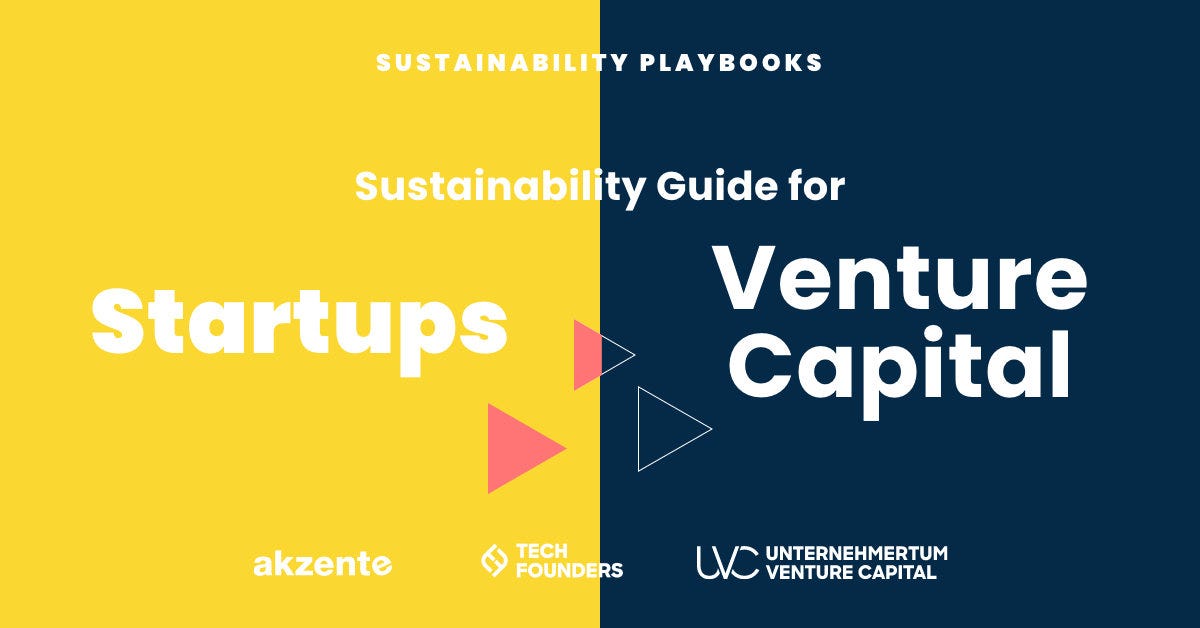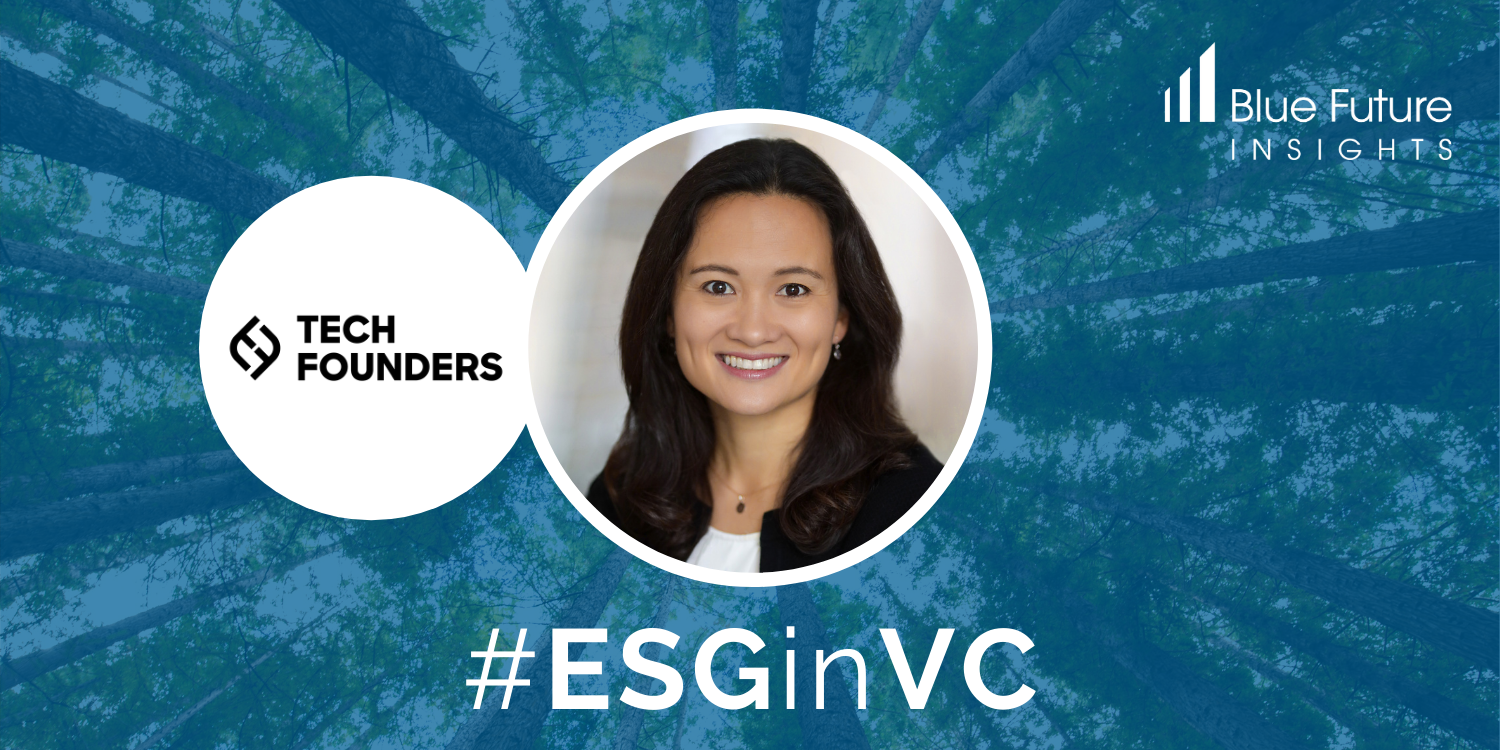With our ##ESGinVC initiative, we want to foster a discussion around ESG and help each other develop and improve our frameworks. As part of this initiative, we spoke to leading managers and LPs about their ESG frameworks. The long-form interviews will be published in a reader on our website, while we will regularly post interview extracts on our social media channels (Linkedin — Twitter — Medium).
The extract below is from the interview with Miki Yokoyama, Managing Partner at Tech Founders.
Already published: Farooq Abbasi (Preface Ventures, Diversity VC), Fabian Heilemann (Earlybird, Leaders For Climate Action), Kanyi Maqubela (Kindred Ventures), David Teten (Versatile VC), Liz Broderick & Chrys Chrysanthou (Kindred Capital).
Coming soon: Kinga Stanislawska (Experior VC & European Women in VC), Bettina Denis (Gaia Capital Partners), Ha Duong (Ocean Investment), Andreas Surya & Richie Wirjan (Kejora Ventures) and Catherine Dupéré (Isomer Capital).
—
Can you tell us about sustainability and ESG at TechFounders as a firm and as an investor?
TechFounders is a B2B-startup accelerator, which connects early-stage startups and corporates to conduct pilot projects and helps startups with comprehensive coaching and trainings, as well as with access to our broad VC and mentor network to get to the next level.
Sustainability should be an important aspect for every startup wanting to be successful in the long-term. Being able to balance profit, people, and planet right from the start is something we want to support young startups with so that they can be a positive force in the world once they scale and grow.
“Sustainability should be an important aspect for every startup wanting to be successful in the long-term.”
Last week you released two sustainability playbooks: one for startups and one for VCs. Can you tell us more about this initiative and how it got started?
Sustainability as the foundation of doing business has been a topic of great interest for me for many years. During an internship at the BMW Group in sustainability communications, I met Thomas Melde, who now owns a sustainability consultancy company, and who has been driving corporate sustainability topics for a decade. Together, we contemplated that while sustainability has been an important topic at bigger corporates for many years due to regulations, supply chain transparency requirements and reputational risks, it has not really arrived in the startup and VC scene yet.
For many VCs and startups, it is an unfamiliar and often wrongly understood topic, for example that it is only about climate change, or that it will only make your products more expensive.
We wanted to help these two groups to really leverage the power of sustainability and thought we were the perfect combination. Thomas with his experience in corporate sustainability, and me with the know-how and network in the startup and VC scene. Anne and Johannes from UVC Partners then completed the package with their extensive knowledge in the VC industry. It was a perfect fit!
And with loveto, we found a brilliant branding and design partner, who put this project to life with fantastic graphics and phenomenal visual language. It really turned out to be much better than I had ever imagined!

Earlier this year you published the results of a survey on sustainability in startups. One of the key findings is that “VCs are currently not driving startups to think about sustainability”. Why do you think this is happening? What needs to change?
Early-stage startups, especially software startups, who do not have a resource-heavy supply chain, and B2B startups, who are not under the scrutiny of the individual customer, are too small and insignificant to stand in the public and legislative spotlight regarding supply chain transparency violations, their environmental footprint, or sophisticated governance and ethics policies.
The same goes for venture capital funds, who fly largely under the radar when it comes to their responsibility and leverage as an investor of future large corporates. In the past, VCs were focused on achieving the returns for their investors by primarily looking at the financial side, overlooking all the possibilities and potentially higher returns and fewer write-offs.
What changed in the past two years is a lot of movement around the climate change debate, which triggered further discussions around the broader topic of sustainability. And what changed too is the realization that the startups of today will become the corporations of tomorrow and that there is a lot of potential to build a business model on a sustainable footing at an early stage. For large corporates, it is much more difficult to change established processes and products, but smaller startups can still build their products, value chains, processes and incorporate the balance of economic, environmental, social and governance aspects from the start.
“…there is a lot of potential to build a business model on a sustainable footing at an early stage.”
What still needs to change now is that VCs must:
1) become fully aware of their responsibility in shaping a company,
2) build their knowledge on what sustainability at a venture capital company really means,
3) take action to integrate sustainability across all five levers: their strategy, their fundraising and LP management, their investment process, working with their portfolio companies, and setting an example themselves.
We hope the Sustainability Playbooks will get VCs started on these issues and that it will spark conversations and actions across the industry.

What are the main obstacles for early-stage startups when it comes to structuring and implementing ESG policies? How should they balance focus on sustainability with the challenges and priorities of building a business from scratch?
I think founders often do not know how and where to start, and that they often do not know what sustainability really means. We are often faced with dissolving the stereotype that sustainability would make them a social business, or that will come at a cost, or that it simply isn’t a topic for them.
Sustainability inherently means looking at things with a very long-term perspective. Originally, the term comes from the forestry industry and describes the principle of not cutting down more trees than can grow back.
Translating this for startups means to look at their idea and their product and to think about these topics when they are building their business from scratch. What are the opportunities in terms of maximizing the positive social and environmental impact with my product and business model? What are the potential environmental, social and governance risks in conjunction with my product and business model? What is the right balance of economic, environmental, social and governance issues for my own company so that I can ensure my long-term success?
Incorporating these questions and answers right from the start in your product development, the setup of your production, your value chain, your hiring and talent management and more will open up new perspectives and opportunities for every business.
What is your outlook for the next 5–10 years on “sustainability in VC”?
I believe that the topic of sustainability will become much more relevant for VCs and for startups. With new regulations and developments on the European level regarding climate action and economic transparency, the climate crisis affecting more and more industries and aspects of our lives, consumers becoming more aware and demanding, and transparency demands on value chains and supply chains increasing heavily — it will be a topic that no one can ignore if they want to be successful.
“Sustainability … will be a topic tat no one can ignore if they want to be successful.”
We will see a consolidation of efforts, as we saw in the corporate world, to standardize and establish frameworks for startups and venture capitalists, accompanied by reporting requirements and rating models. I hope that important players in Germany such as UnternehmerTUM as the largest entrepreneurship center in Europe, the German Startup Association, and grassroots organizations such as Leaders for Climate Action or the Greentech Alliance will work together fruitfully to jointly shape these developments.
—
About Miki Yokoyama
After several years in the corporate strategy division in the area of sustainability at the BMW Group and as a consultant at the Boston Consulting Group, Miki now heads the startup acceleration division “TechFounders” at UnternehmerTUM, the largest entrepreneurship and innovation center in Europe, based in Munich. Since January 2020, she also fills the role of COO for the newly launched impact accelerator ‘RESPOND’ of the BMW Foundation Herbert Quandt.
With the Sustainability Playbooks, she seeks to contribute to a sustainable transformation of the economy and help founders to secure their future viability and long-term success, as well as show venture capital firms ways to support founders in this process.
Linkedin
About TechFounders
TechFounders is a tech-startup acceleration program which brings corporations and startups together for pilot projects and supports startups in a 5-month program of coachings, mentorings, and access to its broad network of investors. It has 119 alumni startups worldwide, which have raised more than €300 million in funding. It is part of the entrepreneurship and innovation center UnternehmerTUM, based in Munich, Germany.
Website — Linkedin — Twitter
About Marco Cesare Solinas
Marco is an Analyst at Blue Future Partners, where he is responsible for sourcing and analysing new investment opportunities. He is passionate about Technology and Venture Capital and making an impact with investments. He focuses on both direct and indirect investments.
Previously, he has built an international and multicultural background across Italy, US, Germany, Turkey and Malaysia. Marco holds a CEMS Master’s in International Management and a Bachelor´s in Economics and Finance from Bocconi University.
Linkedin — Twitter — Medium
About Blue Future Partners
Blue Future Partners is a Fund of Funds with decades worth of experience in investing in Venture Capital. We specialize in backing Emerging Managers focused on early-stage technology investments. We are people-centric and relationship-driven. We have a global mandate and existing relationships with Emerging Managers in the US, Europe, Israel, China and South East Asia.
Website — Linkedin — Twitter — Medium








